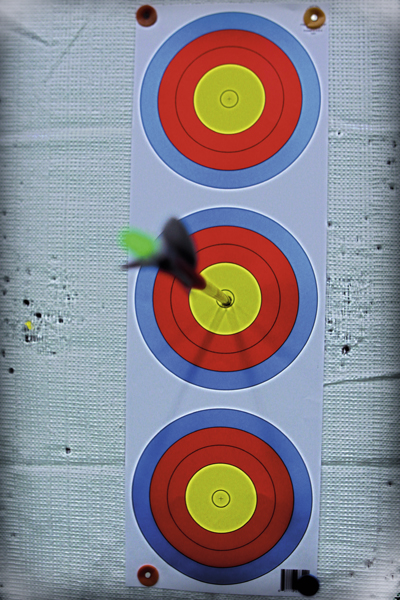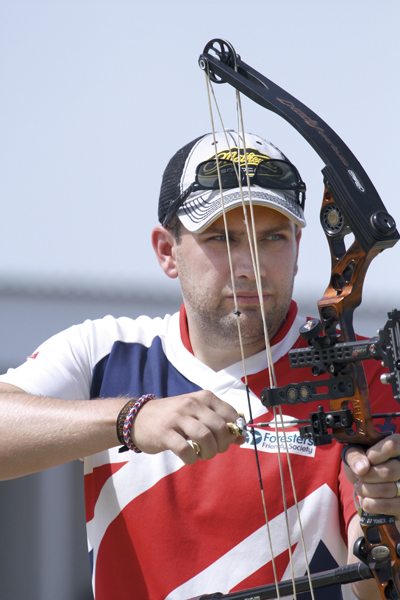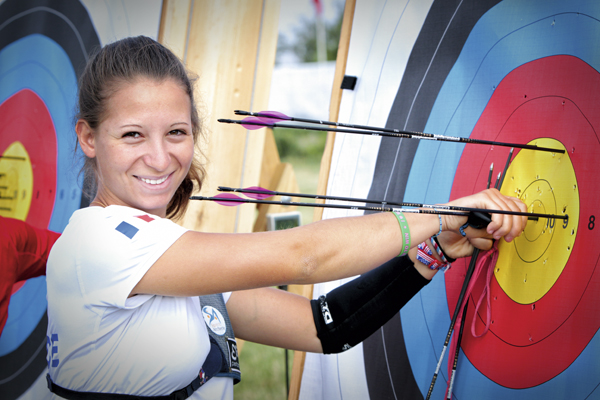In a stressful situation, Duncan Busby says learning how to deal with performance pressure is key to becoming a better archer
Performance pressure will affect every archer at some point, whether you’re practicing down at your local club or competing at a world class event, you’ll find that in times of stress your scores can suffer.
Archery is an enjoyable sport: if this wasn’t the case, why would we do it? Hours of practice can make the entire process of drawing a bow back and aiming at the target seem like second nature to us, but when we perceive pressure, whether it’s justified or not, our focus shifts and we can suddenly lose any skill and enjoyment we had for the sport; what was once simple becomes difficult and frustrating.
You can’t avoid pressure when you participate in a competitive sport, so how do you stop it affecting your results?
You have successfully aimed and shot an arrow many times without deliberate thought, it’s automatic – the archery field is familiar, your arrow score is unimportant, and the archers around you are friendly. However, when the situation changes to a foreign shooting field, with well-known and competitive archers with whom you are in direct competition, you begin to think about what you’re doing and how you’re doing it.
You try to control an already stressful situation by affecting your results. In other words, your conscious has taken over from your sub-conscious. Unfortunately your conscious thought processes are far slower than your sub-conscious autopilot and as you try to work out the principle of your shot routine your score begins to suffer. Now in order to avoid this self-destructive pattern we first need to understand the reasons why we’re affected when the arrow really counts…
Your autopilot allows you to complete actions with little effort or thought; when you begin archery you must independently learn how to nock your arrow, draw your bow, aim at the target and then pull through your release, but, once mastered, these actions are combined to form the more complicated task of ‘shooting’. This automatic function is an important behaviour that relies on a secure and positive learning experience – without such a deep-rooted confident belief that we understand and know how to carry out these tasks automatically without thinking, we’d never be able to make a cup of coffee, drive a car or shoot a bow without having to constantly re-learn every action.
Negative thoughts and emotions cannot alter your autopilot’s capability, they merely distract you from engaging it. There are any number of reasons why you lose focus, but these can be interpreted as either emotional interference or over-analysis of the method.
Emotional interference – emotion vs. logic
Engaging your emotions when competing can be extremely beneficial; the passion, confidence and commitment you feel for your sport can drive you towards success, but when you begin to determine your self-worth by your achievements, your fear of failing can start to hold you back.
Your expectation will always have an effect on the outcome – if you believe you must succeed because it reflects on your self-worth as an archer then your shooting will only ever be intense and un-enjoyable. Alternatively, if you allow a previous bad experience to determine all your future efforts your prediction of failure is more likely to come true. Have realistic expectations or no expectations at all, because unless you leave room for the surprise outcomes you risk disappointment.

Understanding the reasons you become affected when the arrows really count is important in avoiding a self-destructive thought pattern
A good self-image is a great benefit to any athlete and will work wonders for your results, but confidence in your ability should not be mistaken for expectation; believing that you are capable of success is constructive and positive, whereas focusing on the importance of success or your own chances of achieving it can create stress. When the end result is ignored the pressure to perform disappears and all that should remain is a positive and secure mind-set.
Archery is also more likely to be enjoyable and successful if you have perspective. Reassuring yourself that it is just a sport and the outcome is not important doesn’t mean that you won’t try – rather, that you recognise that personal success is achieved when you fulfil your own potential, not when you win, and it can always be achieved next time, if necessary.
Fear of failure or judgement is a negative mind-set and it will only ever distract you from the task in hand. Push bad thoughts from your mind and focus on what you’re doing rather than worrying about your weaknesses.
Over-analysis – instinct vs. reasoning
Habit-forming is instinctive, and we develop rituals for everything. From the minute we wake up we’re on autopilot: shower, coffee, commute, work. Then we head home for dinner, telly and bed. Routines make us efficient: they’re practical, comforting and reliable – essential for managing the most repetitive of tasks, particularly archery. The more you practise the more automatic shooting becomes. Though it’s easy to reason that when things aren’t going well the best course of action is to change what you’re doing, focusing on one part of your technique in a pressure situation is not likely to improve your scores. On the contrary, it may distract you from the task you’ve already sub-consciously learnt.
This is not to suggest that you shouldn’t work on your form, but since this process will nearly always affect your results, it’s not a good idea to confuse an already stressful situation. If your scores have suddenly dropped and you feel pressure to perform it is much wiser to stop analysing your actions and re-engage your autopilot, because once you do something differently you teach your brain to expect and fear the unexpected.
Your instinct is important: it allows you to achieve results that are beyond your expectations – how else would we be able to improve our scores or win titles that we’d never achieved before? A successful athlete will not focus on likely reasons for failure, nor will they pressure themselves to improve; if you determine that your competitor is a better archer than you or that your next arrow must be better than your last, you will lose focus and find that hitting the middle is suddenly much harder to do.
The Solution
Identify the pressures you’re feeling: you cannot stop nerves in tense situations but you should explore the reasons why you’re feeling them; use logic to settle your emotions and ask yourself ‘what’s really the worst that can happen?’ If you don’t achieve success this time don’t punish yourself, just make sure the outcome is constructive; learn from your results so you don’t make the same mistakes again.
Allow yourself to enjoy the experience and make the most of the situation; whether you’re out practicing on a sunny day rather than being stuck in work, or you have the privilege to shoot at a world-class event with elite archers, remember why you took up archery in the first place.
Be positive: how you see yourself and your fellow archers will have an enormous effect on your results. Surround yourself with positive people, not the ones who bring you down.
Don’t try to rationalise the situation or analyse your methods; if you already have the outcome mapped out in your head you’ll never break free of your own calculations and achieve the unimaginable.
Finally, if you do find yourself unable to focus, distract your conscious mind by listening to your favourite music or running through your shot routine, do anything that will allow your autopilot to complete the actions it knows well without emotional interference or over-analysis.
Remember, you already know what to do without having to think about it, so direct your energy in a positive way and performance pressure will be a thing of the past.



